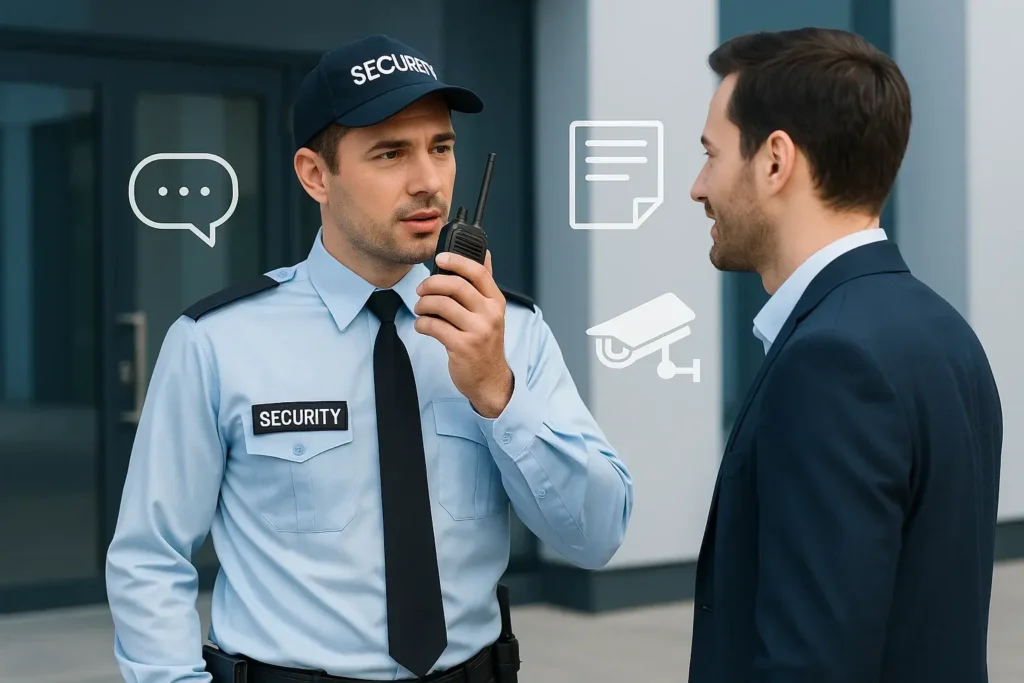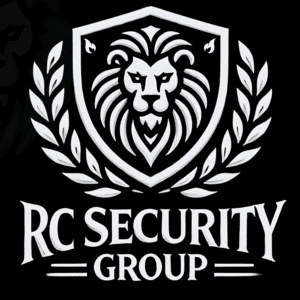Table of Contents


Effective Communication Skills for Security Guards: A Complete Guide
Introduction
Strong communication skills are equally relevant when it comes to security in the world as opposed to physical presence or technical prowess. Be it a personal security guard, a team managing the security of an event, or a team managing corporate security, good communication is the key to trust, efficiency, and safety. The security guards usually encounter the employees, customers, or visitors first, and, therefore, their skills and competencies in the field of communication and confidence in their words are critical.
This guide is going to discuss why communication skills are important, the various forms of communication security guards require, and how ensuring that communication skills are enhanced can make operations safer and smooth.
Why Are Communication Skills Important for Security Guards?
Security guards are responsible for more than just surveillance and protection. They interact with people daily, manage incidents, and often act as mediators during conflicts. Strong communication skills help them:
- Prevent misunderstandings by giving clear instructions.
- De-escalate tense situations before they turn into emergencies.
- Work effectively with teams during incidents or emergency and incident response.
- Provide a positive experience for clients and the public.
For example, in a retail setting, guards who combine retail security expertise with excellent communication can handle shoplifting incidents discreetly while maintaining a friendly environment for genuine customers.
Types of Communication Every Security Guard Needs
1. Verbal Communication
Clear speech is vital when explaining rules, giving directions, or addressing conflicts. Security guards should:
- Use polite but firm language.
- Avoid jargon when speaking to the public.
- Speak confidently to establish authority.
This is especially important during event security, where guards may need to manage large crowds or guide attendees quickly in case of emergencies.
2. Non-Verbal Communication
Body language often speaks louder than words. Guards should maintain:
- Good posture to reflect confidence.
- Eye contact to show attentiveness.
- Calm gestures to reassure people during tense situations.
In areas such as mobile patrol, where guards may encounter unknown risks, their non-verbal communication can prevent escalation by showing calm authority.
3. Written Communication
Reports and logs are essential in the security industry. Guards must be able to:
- Write clear and accurate incident reports.
- Record details in daily logs for future reference.
- Document suspicious activity spotted during CCTV monitoring or alarm monitoring.
Good written skills ensure accountability and help businesses with asset protection and compliance.
4. Technological Communication
With modern tools like radios, surveillance systems, and access control devices, guards must know how to:
- Communicate through radio channels without confusion.
- Relay information quickly using security apps.
- Share real-time updates during emergencies.
How Communication Improves Security Effectiveness
Better Team Coordination
In corporate security environments, guards often work in teams. Strong communication ensures:
- Everyone understands their responsibilities.
- Quick coordination during emergencies.
- Smooth handovers between shifts.
Building Trust with the Public
A friendly greeting or polite interaction can change how people perceive security staff. Guards who listen actively and respond respectfully earn trust, making it easier to manage situations without conflict.
Effective Incident Management
Better Team Coordination
In corporate security environments, guards often work in teams. Strong communication ensures:
- Everyone understands their responsibilities.
- Quick coordination during emergencies.
- Smooth handovers between shifts.
Building Trust with the Public
A friendly greeting or polite interaction can change how people perceive security staff. Guards who listen actively and respond respectfully earn trust, making it easier to manage situations without conflict.
Effective Incident Management
When handling emergency and incident response, every second counts. Guards must communicate clearly with teammates, emergency services, and the public. Poor communication can delay responses, while effective communication saves lives.
Common Challenges in Security Guard Communication
Although it is important but communication is not always simple. Some challenges include:
Language Barriers: Guards can be employed in different communities, such as Brisbane, where not all people can speak fluent English.
High-Stress Environments: Guardians can have trouble staying calm and clear when it is an emergency.
Excessive Authority use: Guards can be rude or aggressive unless communication is moderated with empathy.
Communication training can eliminate these difficulties.
Tips for Security Guards to Improve Communication Skills
Practice Active Listening
Just listen and do not merely plan to respond when the other person is talking. This will create a sense of trust and make sure that guards comprehend instructions well.
Stay Calm Under Pressure
It does not matter be it is retail security theft or a crowd problem during event security, remaining calm diffuses situations.
Use Simple Language
Do not use complicated language when addressing people. Concise instructions are easy to understand.
Train in Conflict Resolution
Guards are supposed to be trained on how to tackle disputes in a professional manner, whereby there is less need for physical intervention.
Role-Play Scenarios
The training can equip guards with on-the-job training activities, which include alarm monitoring, alerts, and mobile patrol interactions.
Improve Written Skills
Write daily reports, pay attention to writing and professionalism.
Keep up to Date on Technology
The knowledge of systems, such as CCTV surveillance and an access control system, allows the guards to be able to interact with digital tools.
Communication and Client Relationships
Security is not only about protection but also about client satisfaction. Guards who communicate effectively with clients:
- Show professionalism.
- Build long-term trust.
- Represent the company positively.
For instance, a personal security guard working with high-profile clients must balance firmness with discretion, ensuring clients feel both safe and respected.
How RC Security Group Trains Guards in Communication
At RC Security Group, we recognize that effective communication is the backbone of excellent security service. That’s why we provide training that covers:
- Handling emergency and incident response with clarity.
- Using technology like CCTV monitoring and alarm monitoring efficiently.
- Building client relationships through professional communication.
This approach ensures our guards not only protect but also create a safe and welcoming environment.
Conclusion
One of the most useful skills that a security guard could possess is effective communication. From event security to corporate security, good communication can be used to avoid incidents and to create trust, and also to facilitate smooth operations. Regardless of the nature of communication, be it verbal, non-verbal, written, or technological, it is important to mention that all of these communications are critical in the process of ensuring safety and professionalism.
At RC Security Group, we are confident in giving our guards the ability to protect, serve, and communicate effectively. We put emphasis on communication and it is through which we can provide our clients with the most reliable security services that are also friendly and professional.





